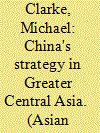| Srl | Item |
| 1 |
ID:
119082


|
|
|
|
|
| Publication |
2013.
|
| Summary/Abstract |
Recent commentary on China's approach to Afghanistan has argued that it is either driven by opportunistic "free riding" on US-NATO efforts or a fundamental caution determined by security concerns in its restive province of Xinjiang. In contrast, this paper argues that China has three primary goals with respect to Afghanistan that mirror those toward the other states in "Greater Central Asia": (1) to ensure the security of Xinjiang; (2) to secure the development of greater economic links, including investment in natural resources; and (3) to combat the influence of the United States and India.
|
|
|
|
|
|
|
|
|
|
|
|
|
|
|
|
| 2 |
ID:
119084


|
|
|
|
|
| Publication |
2013.
|
| Summary/Abstract |
In 2011, after more than 20 years of direct rule, the Tatmadaw transferred formal authority to a nominally civilian government following Myanmar's first multi-party election since 1990 as part of a transformation of the political system to a presidential republic. Within this new arena, though, electoral manipulations and constitutional stipulations have brought to power a government consisting mostly of former military officers who are closely aligned to the Tatmadaw. These reforms, therefore, have changed the nature and organization of the ruling regime from that of a military one to an Electoral Authoritarian form. Elections now have become the main conduit to accessing power. Despite the maintenance of authoritarian rule (and the unclear motivations promoting such system change) the opening of the political realm and civil society creates avenues for new actors, identities, interests, and relationships to be constructed. A number of developments over the past few years are tentatively positive signs that Myanmar is undergoing a fundamental political change distinct from the years of military rule. In particular, the interactions of actors within and across civil-military, central-regional, and foreign relations will come to define the future trajectory of these reforms. Ultimately, the willingness of the Tatmadaw to abandon its praetorian ethos of directing the political process, specifically over security policy areas, will determine whether the system remains primarily in the service of regime maintenance or becomes an arena of increasingly diverse, free, and fair political discord with the possibility of power being assumed by those that are non-military.
|
|
|
|
|
|
|
|
|
|
|
|
|
|
|
|